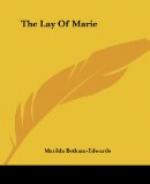Plusurs en ai oi conter,
Nes voil laisser ne oublies,
&c.[4]
Plusurs le me ant conte et
dit
Et jeo l’ai trove en
escrit, &c[5]
She confined herself to these subjects, and the event justifies her choice. To the singularity of such a measure was owing its celebrity. By treating of love and chivalry, she was certain of attuning her lyre to the feelings of the age; and consequently of ensuring success. Upon this account her Lays were extremely well received by the people. Denis Pyramus, an Anglo-Norman poet, and the contemporary of Mary, informs us that they were heard with pleasure in all the castles of the English barons, but that they were particularly relished by the women of her time. He even praises them himself; and this from the mouth of a rival, could not but have been sincere and well deserved, since our equals are always the best judges of our merit.[6] Insomuch as Mary was a foreigner, she expected to be criticised with severity, and therefore applied herself with great care to the due polishing of her works. Besides, she thought, as she says herself, that the chief reward of a poet, consists in perceiving the superiority of his own performance, and its claims to public esteem. Hence the repeated efforts to attain so honourable a distinction, and the constant apprehensions of that chagrin which results from disappointment, and which she has expressed with so much natural simplicity.
Ki de bone mateire traite,
Mult li peise si bien n’est
faite, &c.[7]
She has dedicated her lays to some king,[8] whom she thus addresses in her Prologue:
En le honur de vos nobles
reis,
Ki tant estes preux et curteis,
M’entremis de Lais assembler.
Par rime faire et reconter;
En mon quoer pensoe et diseie,
Sire, le vos presentereie.
Si vos les plaist a receveir.
Mult me ferez grant joie aveir,
A tuz juirs mais en serai
lie, &c.[9]
But who is this monarch? 1. We may perceive in it her apprehension of the envy which her success might excite in a strange country: for this reason she could not have written in France. 2. When at a loss for some single syllable, she sometimes intermixes in her verses words that are pure English, when the French word would not have suited the measure.—“Fire et chaundelez alumez.” It should seem, therefore, that she wrote for the English, since her lines contain words that essentially belong to their language, and




